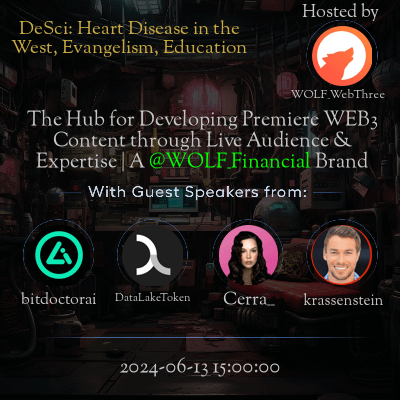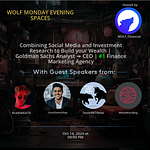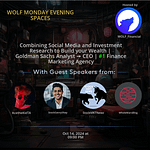This space is hosted by WOLF_WebThree
Space Summary
Exploring health, longevity, and lifestyle choices, this Twitter space delved into challenges and skepticism surrounding increasing average lifespans. Topics included health issues such as cholesterol, plaque in arteries, and the role of saturated fats, along with the use of medications to mitigate risks. Participants also reflected nostalgically on past habits and trends in health awareness. Despite technical difficulties with music playback, the session provided a light-hearted moment resembling typical tech support humor, offering insights into DeSci: Heart Disease in the West, nutrition, health education, agentic technology, mass transit infrastructure, and data sharing.
Questions
Q: What health issues were discussed?
A: Cholesterol and plaque in arteries.
Q: What is the speaker skeptical about regarding lifespans?
A: Significantly increasing average lifespans beyond 100 years.
Q: How are people becoming more conscious of their health?
A: By reducing saturated fat intake.
Q: What drugs were mentioned as helpful in preventing artery clogging?
A: Statins and fish oil.
Q: What was the speaker nostalgic about?
A: Past lifestyle habits and dietary choices.
Q: What was the challenge faced during the space?
A: Difficulty in playing music.
Q: What was the plea for help related to?
A: Technical issues with music playback.
Q: What humorous tech support advice was given?
A: "Have you tried turning it off and turning it back on again?"
Q: What action was requested regarding music?
A: A call to play music as the space concluded.
Highlights
Time: 00:02:06
Introduction to DeSci Evangelism, Discussion on how to better evangelize decentralized science and educate the world on its value.
Time: 00:11:05
Web3 and Health Data Sharing, Insights on how Web3 can be utilized to share health records and democratize information.
Time: 00:16:14
Simplifying User Interfaces, The importance of making user interfaces simple to encourage engagement.
Time: 00:29:29
Gamification in Health Education, Suggestions on using gamification to improve public health education.
Time: 00:42:21
Consistency and Accountability, Emphasis on measurable metrics and community support for maintaining health practices.
Time: 00:45:52
AI in Health Data, Discussion on using AI models to improve health outcomes based on collected data.
Time: 00:53:01
Future Discussions on DeSci Evangelism, Plans for future spaces to continue discussing ways to spread the word about DeSci.
Time: 00:59:51
Call to Action, Encouragement for contributions and collaboration in the DeSci community.
Key Takeaways
- Inevitability of health issues like cholesterol and plaque in arteries.
- Skepticism about significantly increasing average lifespans beyond 100 years.
- Speculation on the possibility of living longer despite potential health challenges.
- Increased awareness of the impact of saturated fats on health.
- Use of drugs like statins and fish oil to mitigate health risks.
- Nostalgia for past lifestyle habits and dietary choices.
- Reflection on past trends in health awareness.
- Challenge of playing music during the Twitter space.
- Seeking help to resolve technical issues with music playback.
- Humorous reference to typical tech support advice.
Behind the Mic
you know, is this term I've been looking into. It's called agentic technology, and I think it fits in well with here. It's like technology that sort of does what you want it to do. Not when you log into Instagram. Right. Like, it doesn't have your best interests at heart. And with agentic technology, you can sort of express your preferences and then the technology can sort of personalize your experience to you. So it relates to back what you're, to, what you're saying was that, like, you know, some people don't, will make bad decisions even if it's not sort of in their long term interest because of like a short term thing. And so, like, you know, if you have all this data that's living on your phone, and if you can have an agentic agent that works on your behalf, it's like a new, it's a new way of, like, building technology where it's like user first as opposed to, like, Facebook marks after work meta first, where it's like it's doing things on your behalf. And I think this is the sort of breakthrough that's going to be needed to develop these types of systems that, like, you know, will do what you want. You do what you want to do. It's like, it's like a, as opposed to, like a doctor who's just trying to get you to come back or a pharmaceutical company is trying to get you to come back. And that's one of the things that I'm very excited about and relates to this space. Patrick, have we become so unmotivated so that, you know, that we need all these special gizmos or, like, what you're saying is some people just don't care. It's like, yeah, you know, this will take ten to 20 years off my life. I mean, my motivation is I wake up every morning, and if I look in the mirror and I'm like, oh, my God, it looks like getting a beer gut. You know, like, I'll go do a couple laps or something like that. Or I look at the Krasinstein brothers flexing, and I'm like, oh, damn, I better, you know, I better get my ass in the gym, though. Like, you know, I don't, I'm not, you know, we talk about these different, you're getting in philosophy, right? So it's like, it kind of reminds me of, like, the Socratic dialogues I used to read. And I know Plato was a big fan of tech and everything else, but, you know, and I don't know where Aristotle stood, but like, there's no school that really, um, maybe it's like Epicureans where you're taught just to live a good, decent life by eating well and, um, you know, exercising and having good friends. I imagine that's similar to what you're talking about, right? I assume the same thing's very similar to Epic Haryana ISM, which is basically the ancient version of utilitarianism. Yeah, I must spot on. It's also has a relation with virtue ethics, but yet Epic Haryana ism is certainly something that if we could all aim for that, I think it would all be a lot better and we'd probably live a bit longer as well. Yeah, it's certainly certainly need a lot more focus on this in. I think, I mean, not just the diet. If people take the psi thing, they're going to be a lot more open to the gym membership than not they can take the sylvan thing. We're going to be much more open to taking the proton pump inhibitor. You know? I'm talking about physicians, but I'm not going to give them credit because they're all crooks. There you go. Or, you know, we'll prescribe or we won't prescribe them paracetamol or aspirin and then we'll give them morphine. But we won't give them something that actually works. But the physicians are actually good. Some of them are evil. But anyway, that's digressing. Doctor, tell us about your university. So, uh, go ahead, Steven, I think you wanted to jump in. I was just going to say, I'm sorry, but professor we owe it to you. You've given us so much today. You've been a good, uh, friend of the channels and now with your assistance, you're here, I said and I suspect we'll be seeing more of you very soon. And thank you from I think I've known Patrick well long enough to thank for all of us. Pleasure. Thank you, professor. Yeah, like I said, we're going to we're going to close out here. We're going to go. But just have to ask, where do you think we go next with technology? What what else do you think is the future of technology, where we are and where can we possibly go? Well, to close out this this session, I've been studying the space for quite a long time. I could I could talk to you for another 60 minutes, and I probably will in the future if you'll have me again. I'm a huge fan of the channel. But I think, like, you know, things like Agentic Technology, I think that's only going to become larger going forward. So excited about that. And I think digitizing things like the health records would be, you know, incredible and would be hugely positive. So going forward, that's that's what I would like to see. Thank you. Beautiful. Thank you, thank you. That's all I've got to say. Will, you wanna finish? Yeah. Someone's you guys again. Once we've seen this, once it's up online and, you know, the feedback we've received has been tremendous. I think I counted at least 1500 viewers. We'll get you details later. That's excellent. Thanks. Thank you. All right. Well, look, it's been a pleasure again until the next time from deci 50.1.26. Steven Michaels here, checking out Professor and Z dot dow, if you've got some. Thanks, everyone. Oh, that's what I was going to say, too. So just one last note on to this. I mean, this was a very long, long form discussion. So thank you for hanging with us here. I'd love to hear some more about the other side of this coin. So maybe in a future space, I'd love to hear, you know, what are the reasons that maybe people that are already in science don't want decide to become, you know, a. Why are they worried about D psi or what are the potential, you know, fallbacks or downfalls? I'd love to hear the other side of the coin. Maybe in a future space, too. Yeah. We should invite Pfizer on. Patrick. Oh, my God. Pfizer's got their hand in the space, so they are probably just going to sit here and show Vita now, right? Yeah, I guess that wasn't a fair analogy. Let's pick something more evil, like Monsanto. Oh, God. Oh, God. Don't get me started right now, Will. Yeah, absolutely. Yeah. Thank, thank. Thanks again, everyone. We appreciate everyone. And thank you. Data lake bit. Doctor nfY. Sorry I had to move you down. Moved you back up, brother. Always a pleasure to hear and see what you're working on there at your university. Michelle, thank you for joining us. Doctor Michael Alejandro Poseidon Dow William. Thanks. I've added some of you to our deci Twitter group, so that's where we sort of huddle and talk about what we're going to talk about on the next space. And we decided that were going to talk about dedicated blockchain for deci. So appreciate everybody's thought leadership. It's been amazing so far. And I've learned so much from each of you. Beautiful. All right, wolf, close us out, baby. Have a wonderful day, everyone. Take care. No. Music closes out with, like, some. The thing is, I'm trying. I want to do music. I don't know if maybe someone can please help me. Actually, this is a shout. This is a call to action for help. I cannot get music to play on this basis. I've tried everything. I've even. Sometimes I'll play music from my laptop and it won't pick up. I've tried the speaker thing. It's not this mic mode thing. And there's this automatic music option. Oh, beautiful. Just play me out. Have you tried turning it off and turning it back on again? Did somebody make.







